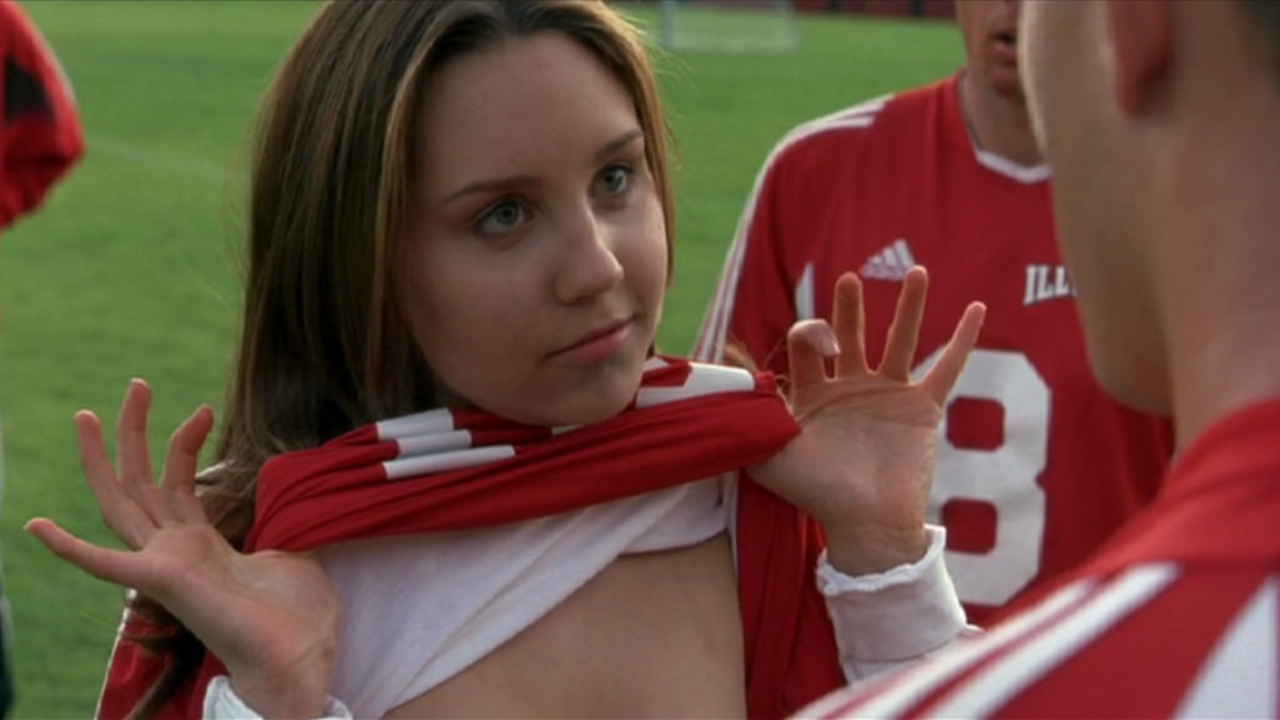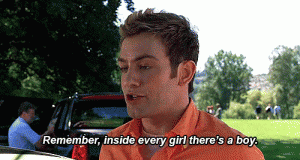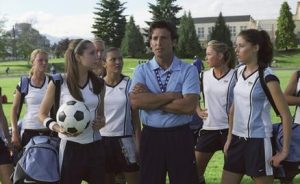Every female soccer player knows, loves and can spew out quotes verbatim of the movie She’s the Man. As a female soccer player myself, I have watched, re-watched and constantly loved this film. It emits a strong sense of feminism that is quickly picked up by the viewer. As a girl who’s played sports my entire life, the theme of this film is incredibly empowering. It illuminates the ideology that women are just as strong and capable as men in the world of sports.
Thrown into the category “chick flick”, She’s the Man does not immediately appear to be a complex portrayal of the human experience within modern society. (As many times as I have viewed it, it is in writing this review that I have realized the direct and obvious relationship to Shakespeare’s play Twelfth Night.)
Director Andy Fickman accomplishes the daunting task of transforming an exhausted Shakespearean play and (at first glance) “chick flick” in the development of Viola as a character throughout the film.
The film opens on a scene dominated by Viola competitively playing soccer with her friends, portraying the extent of her abilities as a soccer player. Aggressively duking out fellow players (including males), Viola runs the ball towards the opposing team’s goal line. This shoot then utilizes a jump cut to a lifeguard’s lifesaver ring, which is put into focus as Viola shoots the ball in the blurry background. When the ball is successfully shot through the ring of the lifesaver, the camera focuses on Viola and her celebration of the accomplishment. The mise-en-scene of this shoot depicts a young woman who clearly has a passion and talent for soccer in ways that the others within the scene (including the males) do not. This furthers the overarching ideology to deconstruct gender stereotypes that Fickman intends.
The plot begins with Viola depicted as a typical high school girl, and a part of the girls’ soccer team. However, the catalyst is quickly thrown into the mix, destroying life as she knows it. Her soccer team is cut from the school, and the boy’s coach (and her boyfriend) mock her for suggesting the girl’s try out for the boy’s team.
“It’s a scientific fact. Girls can’t beat boys! It’s as simple as that.”
-Coach Pistonek
Many a time I have sat around with eighteen of my best friends (my soccer team) to watch this movie, and this line always makes us cringe. “Umm excuse us? We are JUST as good as the boys if not BETTER!” This emotion-filled scene, depicted in the photograph above uniquely illustrates the use of mise-en-scene due to the positioning of the characters. The male coach, who is declaring that females are scientifically proven to be less athletic than males, is being literally surrounding by an offended group of female soccer players. This illustrates the feeling of offense that erupts as an effect of the coach’s words.
This clear patronization instills an emotion of frustration and personal investment into anyone watching the film. As the narration continues, this ideology that “it’s a scientific fact that boys are better than girls” is shattered and the retaliation of feminism succeeds. This is culturally relevant to society today because although women have come a long way, there continue to be lingering biases defining gender roles.
The conflict of gender roles takes center stage again as Viola’s mother begs her to become a debutant and a “woman”. The scenes surrounding the debutant portion of the film illuminate the clear expectations engulfing the ideal image of what a woman “should” be. However, Fickman derails this image by portraying Viola as a more “manly” or “sloppy” woman who is unconcerned with her dainty “womanly” image.
In this scene, Viola is surrounded by young women, like herself, that are all exemplifying the gender roles, while she is knowingly breaking them. This scene hits home with me, and with most athletic women. It’s a comical depiction of what it feels like to be a strong, athletic female. Women are stepping into what has historically been considered male turf (sports), and in turn we are depicted in a more “manly” (meaning sloppier) manner. We are considered “un-lady-like”, just like Viola. And this ideology has plagued our lives. Without knowingly doing so, we have taken this societal definition and placed it upon ourselves. It has been instilled in us that we are “un-lady-like” and “manish”. It’s a commonality to hear an athletic woman joke about how much food she can eat and how fast she can consume it. It’s joked about due to the societal pressure that women are not supposed to eat like this, or be a part of this world in any way. However, by creating the character of Viola, Fickman commends these traits and produces a role model of a strong, independent, young woman who is not defined by these gender roles.
Viola’s character furthers her disgust towards the typical female gender roles in this scene;
Viola decidedly states that she will not be wearing heels because they are “a male invention”. Thus indicating that the gender roles that are placed upon women are placed upon them by men and their expectations and desires. By not wearing heels, Viola ignores the gender role, therefore illuminating Fickman’s intentional disregard of the stereotypical female character.
Gender roles are debunked further within this film in the form of the character Duke, Sebastian’s (who Viola is impersonating) roommate. Unlike the typical image inflicted upon teenage boys, Duke portrays a male character that is interested in more than just boobs and the gym. He has a hard time talking to girls and he desires a relationship that is “more than just physical”. Although he attempts to conceal it, he has a sensitive side. In the macho world of the young male, sensitivity is synonymous with weakness and femininity. Therefore, the gender roles that define men restrict them from showing any form of emotion what-so-ever.
Fickman attacks societal implications of gender roles from both sides of the spectrum. He utilizes a strong female lead to break the expectation that all women are “proper”, and uncover the implications of society’s views on women in the world of sports. Directly parallel to this, he employs a supporting role of a male character who does not fit into society’s expectations of what “male” should look and act like. Together, this lethal combination tears down the sustained ideology defining men and women within society.
At first glance, She’s the man appears to be a simplistic portrayal of a young woman who does something crazy in order to pursue what she desires and falls in love in the end. A classic uninvolved chick flick. However, at a closer look, the feature depicts a complex depiction of the societal gender roles placed upon women, as well as men today. This seemingly simplistic film has had a personal impact upon me throughout my years of soccer and is a classic that has empowered all female soccer players for the duration of their careers.
CITATIONS
“Looking at Movies: An Introduction to Film / Looking at Movies: An Introduction to Film DVD / Writing about Movies Booklet, (9780393934632), Richard Barsam, Textbooks – Barnes & Noble.” Barnes & Noble – Books, Textbooks, EBooks, Toys, Games, DVDs and More. N.p., n.d. Web. 23 Feb. 2017.
She’s the Man. Dir. Andy Fickman. Prod. Lauren Shuler-Donner and Ewan Leslie. By Ewan Leslie. Perf. Amanda Bynes, Channing Tatum, and Laura Ramsey. DreamWorks Distribution LLC, 2006.







